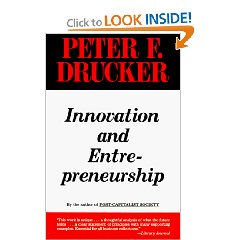Review: Leading Minds–An Anatomy Of Leadership
5 Star, LeadershipReview: Innovation and Entrepreneurship
5 Star, Best Practices in Management, Change & InnovationReview: Unleashing the Killer App–Digital Strategies for Market Dominance
5 Star, Best Practices in Management, Change & Innovation, Information Society, Information TechnologyReview: Post-Capitalist Society
5 Star, Best Practices in Management, Change & Innovation, FutureReview: Reengineering the Corporation–A Manifesto for Business Revolution
5 Star, Best Practices in Management, Change & InnovationThis was the original “reengineering” book and rather than summarize the components of his process I will just name the one big “no no” that the current leadership of the U.S. Intelligence Community is passively pursuing…the most frequently committed error: “Try to fix a process instead of changing it.”
New comment: Buckminster Fuller had it right: create new systems that displace the old ones. The emerging literature is full of examples. Below are ten links I consider relevant to displacing flawed industrial era organizations. See the literatures on social entrepreurship and on civilization building as well as green, sustainable design, etcetera.
The Manufacture of Evil: Ethics, Evolution and the Industrial System
Voltaire's Bastards: The Dictatorship of Reason in the West
Human Scale
Small Is Beautiful, 25th Anniversary Edition: Economics As If People Mattered: 25 Years Later . . . With Commentaries
Society's Breakthrough!: Releasing Essential Wisdom and Virtue in All the People
Teaching to Transgress: Education as the Practice of Freedom
A Power Governments Cannot Suppress
Natural Capitalism: Creating the Next Industrial Revolution
Collective Intelligence: Mankind's Emerging World in Cyberspace
Collective Intelligence: Creating a Prosperous World at Peace










